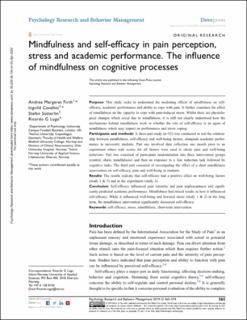| dc.contributor.author | Firth, Andrea | |
| dc.contributor.author | Cavallini, Ingvild | |
| dc.contributor.author | Sütterlin, Stefan | |
| dc.contributor.author | Lugo, Ricardo | |
| dc.date.accessioned | 2020-04-02T12:10:46Z | |
| dc.date.available | 2020-04-02T12:10:46Z | |
| dc.date.created | 2019-07-23T10:37:55Z | |
| dc.date.issued | 2019 | |
| dc.identifier.citation | Psychology Research and Behavior Management. 2019, 12, 565-574. | en_US |
| dc.identifier.issn | 1179-1578 | |
| dc.identifier.uri | https://hdl.handle.net/11250/2650097 | |
| dc.description | © 2019 Firth et al. This work is published and licensed by Dove Medical Press Limited. The full terms of this license are available at https://www.dovepress.com/terms.php and incorporate the Creative Commons Attribution – Non Commercial (unported, v3.0) License (http://creativecommons.org/licenses/by-nc/3.0/) | en_US |
| dc.description.abstract | Purpose: This study seeks to understand the mediating effects of mindfulness on self-efficacy, academic performance and ability to cope with pain. It further examines the effect of mindfulness on the capacity to cope with pain-induced stress. Whilst there are physiological changes which occur due to mindfulness, it is still not clearly understood how the mechanisms behind mindfulness work or whether the role of self-efficacy is an agent of mindfulness which may impact on performance and stress coping.
Participants and methods: A three-part study (n=92) was conducted to test the relationship between mindfulness, self-efficacy and well-being factors, alongside academic performance in university students. Part one involved data collection one month prior to an experiment where trait scores for all factors were used to check pain and well-being behaviors. Part two consisted of participant randomization into three intervention groups (control, sham, mindfulness) and then an exposure to a fear induction task followed by cognitive tasks. The third part consisted of investigating the effect of a short mindfulness intervention on self-efficacy, pain and well-being in students.
Results: The results indicate that self-efficacy had a positive effect on well-being factors (study 1 & 3) and in the experiment (study 2).
Conclusion: Self-efficacy influenced pain intensity and pain unpleasantness and significantly predicted academic performance. Mindfulness had mixed results in how it influenced self-efficacy. While it influenced well-being and lowered stress (study 1 & 2) in the long term, the mindfulness intervention significantly decreased self-efficacy. | en_US |
| dc.language.iso | eng | en_US |
| dc.rights | Navngivelse-Ikkekommersiell 4.0 Internasjonal | * |
| dc.rights.uri | http://creativecommons.org/licenses/by-nc/4.0/deed.no | * |
| dc.subject | self-efficacy | en_US |
| dc.subject | stress | en_US |
| dc.subject | mindfulness | en_US |
| dc.subject | short-term intervention | en_US |
| dc.title | Mindfulness and self-efficacy in pain perception, stress and academic performance. The influence of mindfulness on cognitive processes | en_US |
| dc.type | Peer reviewed | en_US |
| dc.type | Journal article | en_US |
| dc.description.version | publishedVersion | en_US |
| dc.source.pagenumber | 565-574 | en_US |
| dc.source.volume | 12 | en_US |
| dc.source.journal | Psychology Research and Behavior Management | en_US |
| dc.identifier.doi | doi.org/10.2147/PRBM.S206666 | |
| dc.identifier.cristin | 1712402 | |
| cristin.unitcode | 209,6,2,0 | |
| cristin.unitname | Institutt for psykologi | |
| cristin.ispublished | true | |
| cristin.qualitycode | 1 | |

